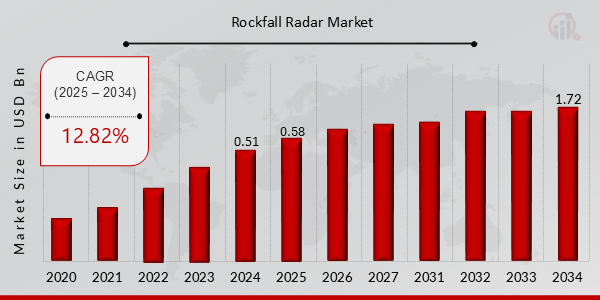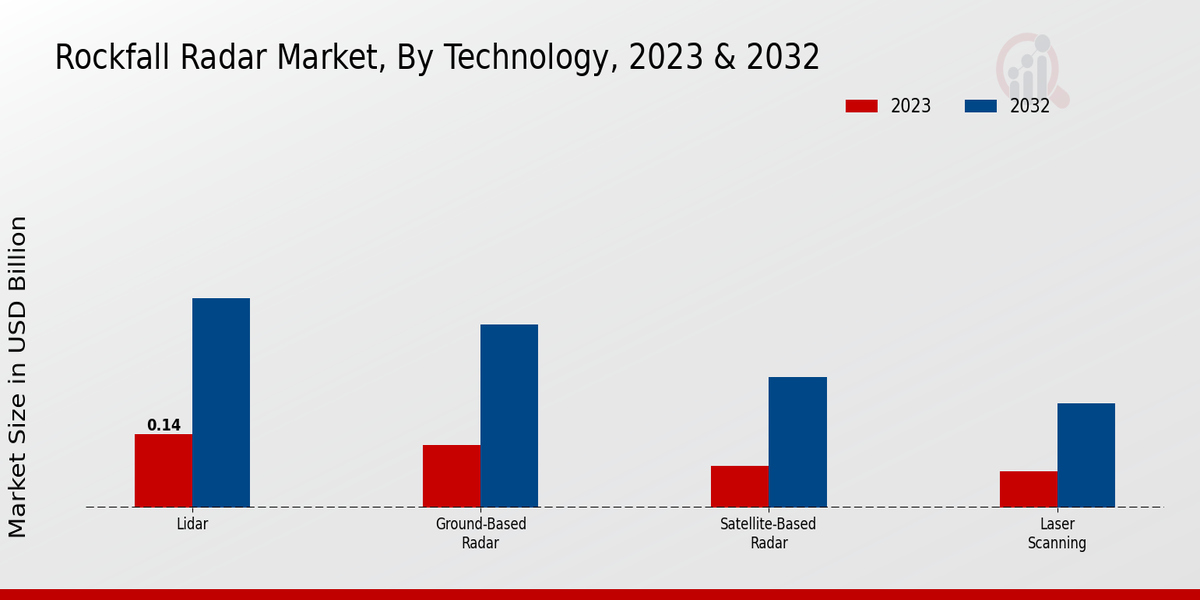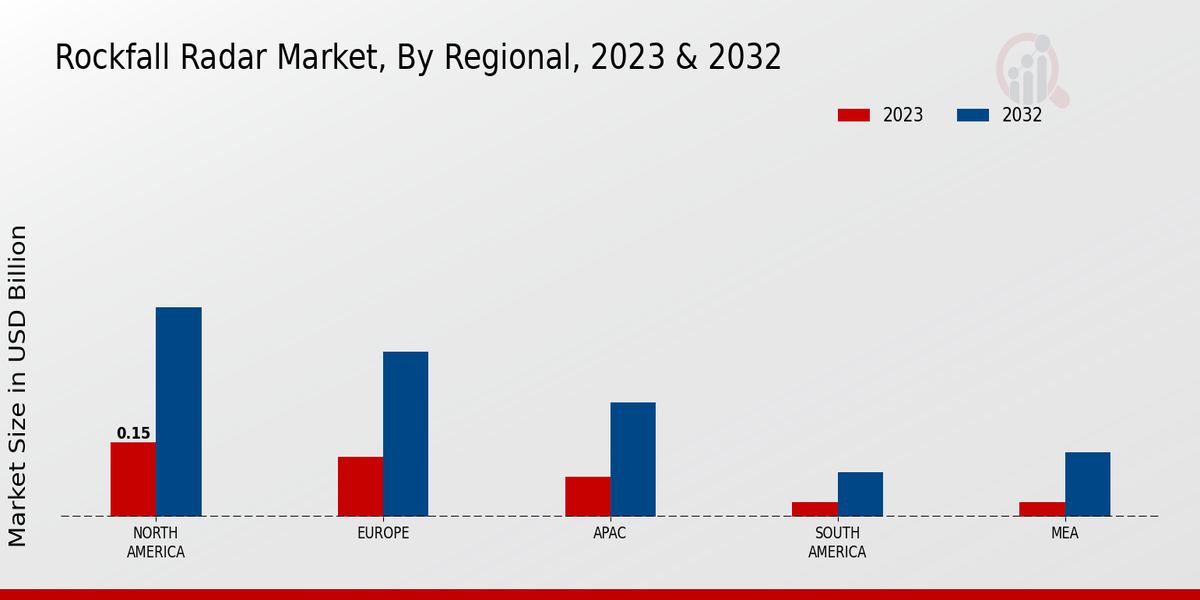Global Rockfall Radar Market Overview
Rockfall Radar Market Size was estimated at 0.51 (USD Billion) in 2024. The Rockfall Radar Market Industry is expected to grow from 0.58 (USD Billion) in 2025 to 1.72 (USD Billion) till 2034, exhibiting a compound annual growth rate (CAGR) of 12.82% during the forecast period (2025 - 2034)
Key Rockfall Radar Market Trends Highlighted
The Rockfall Radar Market is influenced by several key market drivers, including the rising awareness of safety in construction and mining operations. As infrastructure projects expand, the demand for efficient monitoring systems to predict and prevent rockfalls is becoming increasingly significant. These monitoring solutions help to protect not only the workers on-site but also the surrounding environment. Increased investment in technology and advancements in radar systems have also contributed to this growth. As the industry transitions towards more automated systems, the adoption of modern radar solutions is growing, driven by the need for real-time data to improve decision-making processes.
There are numerous opportunities in the marketplace waiting to be captured. The integration of artificial intelligence and machine learning with rockfall radar technology presents a significant prospect, enhancing predictive analytics and improving overall safety measures. Expanding into new geographic regions, particularly in developing countries, can also provide a fresh market base. As more countries invest in infrastructure development, the potential for market growth increases, creating a demand for rockfall monitoring systems. Additionally, the emphasis on sustainable practices in civil engineering can be a gateway for introducing innovative radar systems that prioritize environmental safety.
Recent trends indicate a shift toward more compact and user-friendly radar technology that allows for easier installation and operation. There is an increasing interest in mobile radar units that can be deployed in various terrains, making monitoring more accessible. Furthermore, collaborations between tech companies and traditional engineering firms are becoming more common as partners strive to innovate and improve the reliability of their systems. Such trends reflect a collective movement towards enhancing safety measures and embracing new technology, fostering a safer work environment in industries prone to rockfall hazards.

Source: Primary Research, Secondary Research, MRFR Database and Analyst Review
Rockfall Radar Market Drivers
Increasing Awareness of Geohazards and Landslide Risks
The Rockfall Radar Market Industry is experiencing significant growth due to the increasing awareness surrounding geohazards and the risks associated with landslides in various regions around the world. As climate change continues to impact weather patterns, instances of heavy rainfall, floods, and other extreme weather events have become more common. This has heightened the vulnerability of numerous geographical regions to rockfalls and landslides, which pose serious threats to infrastructure, human safety, and the environment.Consequently, governments and local authorities are now more focused on implementing proactive monitoring and early warning systems to mitigate the effects of these natural hazards.
Rockfall radar systems provide an innovative solution that enables real-time monitoring of unstable slopes, helping to predict and manage potential risks effectively. By equipping regions susceptible to landslides with rockfall radar technology, not only protects communities but also helps preserve valuable infrastructure.The increasing government funding and support for monitoring technologies, in conjunction with collaboration with research institutions on hazard assessment, further propels the growth of the Rockfall Radar Market Industry. As the situation evolves, it is expected that more investments will pour into advanced monitoring technologies and systems, thus creating a favorable market landscape for rockfall radar services.
Technological Advancements in Monitoring Solutions
Technological advancements play a crucial role in the Rockfall Radar Market Industry by enabling the development of more efficient and precise monitoring systems. Innovations in sensor technologies, data processing capabilities, and remote sensing solutions contribute to enhanced performance and reliability of rockfall radar systems. These advanced monitoring solutions offer improved data accuracy, which is vital for predicting rockfalls and other geohazards.As industries continue to adopt state-of-the-art technologies, the demand for high-quality and effective radar systems is poised to increase, driving growth in the market.
Growing Infrastructure Development Projects
The Rockfall Radar Market Industry is significantly influenced by the burgeoning infrastructure development projects across various regions. As countries invest heavily in transportation networks, urban expansion, and the construction of new facilities, the need for effective monitoring and management systems to ensure safety from potential rockfalls becomes imperative. The growing focus on safety standards in construction and infrastructure projects further amplifies the need for advanced rockfall radar systems to minimize risks.This trend is likely to persist as more initiatives are launched, driving demand for monitoring technologies.
Rockfall Radar Market Segment Insights:
Rockfall Radar Market Technology Insights
The Rockfall Radar Market, focused on the Technology segment, is a burgeoning sector showing significant promise. In 2023, the valuation stood at 0.41 USD Billion, with projections suggesting an increase to 1.2 USD Billion by 2032, reflecting sustained interest and investment in this field. The market growth is driven by advancements in monitoring technology, which facilitates enhanced safety in areas prone to rockfall disasters. Among the diverse technological options available, LIDAR stands out with a substantial value of 0.14 USD Billion in 2023, expected to rise to 0.4 USD Billion by 2032.This growth makes LIDAR a dominant player, as it combines high precision and efficiency in capturing data for analysis.
Ground-Based Radar, with a 2023 valuation of 0.12 USD Billion, is also gaining traction, reflecting a market that acknowledges the importance of real-time monitoring systems. This technology's capability to scan vast areas from a fixed position offers critical insights into potential hazards. In contrast, Satellite-Based Radar, although emerging, is valued at 0.08 USD Billion in 2023, growing to 0.25 USD Billion by 2032, indicating its increasing relevance in the landscape of global monitoring systems, yet it remains less significant compared to LIDAR and Ground-Based Radar due to its dependency on broader satellite infrastructure.Laser Scanning represents a niche but critical aspect of the market, valued at 0.07 USD Billion in 2023 and projecting to 0.2 USD Billion by 2032. This technology serves specialized applications such as detailed terrain mapping and analysis, supporting the overall safety initiatives in rockfall-prone regions.
As the Rockfall Radar Market segmentation evolves, the focus on these technologies will likely shift to more sophisticated solutions that cater to the demands of government entities and contractors engaged in infrastructure projects.The trends indicate a surge in the adoption of integrated systems that provide comprehensive safety assessments in vulnerable areas, thus driving the market statistics onward. Overall, the technology segment within the Rockfall Radar Market shows a diverse landscape where LIDAR and Ground-Based Radar are notably significant, while the increasing acknowledgment of satellite-based and laser scanning technologies suggests healthy competition and diversification within the industry. As infrastructure development increases in mountainous regions, the demand for reliable monitoring technologies will undoubtedly rise, creating numerous opportunities for growth in this sector.The continuous advancements in radar and scanning technologies are thus essential for addressing the ongoing challenges in rockfall monitoring, making this a critical area for future exploration and investment.

Source: Primary Research, Secondary Research, MRFR Database and Analyst Review
Rockfall Radar Market End Use Insights
The Rockfall Radar Market is gaining traction across various end-use sectors, with significant revenue generation expected as it fulfills safety and monitoring needs. In 2023, the overall market is valued at 0.41 USD Billion, and by 2032, it is projected to reach 1.2 USD Billion, highlighting robust market growth potential. The Transportation Infrastructure sector plays a crucial role, as it aims to enhance road and rail safety through effective monitoring of rockfall hazards. The Mining Industry benefits substantially from rockfall radar technology, ensuring the safety of operations and minimizing environmental impact during excavation processes.Similarly, the Construction Industry increasingly relies on these solutions to manage risks associated with excavations and site stability, thus safeguarding workers and investments. Urban Development also aligns with the growing market, as cities focus on preventive measures to protect infrastructure and residents from geological hazards. Overall, these segments reflect the critical importance of the Rockfall Radar Market in promoting safety and risk mitigation across diverse applications, contributing to its increasing demand and expanding market presence.
Rockfall Radar Market Mountains and Terrain Types Insights
The Rockfall Radar Market, focusing on Mountains and Terrain Types, is experiencing significant growth, with the overall market valued at 0.41 billion USD in 2023 and projected to reach 1.2 billion USD by 2032. The market growth is driven by the increasing demand for safety measures in mountainous terrains, which are prone to rockfalls and other geological hazards. Mountainous areas hold a major share due to their complex topographies, leading to higher rockfall incidents, while hilly regions also represent a significant portion as they require reliable monitoring solutions.
Steep slopes are crucial in the environmental monitoring context, as they often face severe stability issues, thereby driving the need for innovative radar technologies. Meanwhile, rocky terrains are becoming increasingly important as they present unique challenges for construction and infrastructure projects, necessitating advanced solutions for risk mitigation. The Rockfall Radar Market statistics reveal that investments in these areas are expected to rise substantially, paving the way for advanced technologies and higher safety standards across various industry sectors.Overall, this segment reflects a robust demand for innovative solutions to address the challenges presented by diverse terrains, driving sustained market growth.
Rockfall Radar Market Component Insights
The Rockfall Radar Market, valued at 0.41 USD Billion in 2023, showcases a diverse Component landscape that plays a crucial role in its performance and market growth. Among these components, Radar Sensors hold significant importance due to their ability to detect rockfall activity in real-time, thereby reducing potential hazards for infrastructure and populations. Data Processing Software is also vital, enabling the analysis and interpretation of the data acquired by radar sensors, ultimately aiding in decision-making and risk assessment.
Display Systems are essential for visually representing the data and providing critical information for monitoring purposes. Monitoring Systems play a dominant role in continuous surveillance, ensuring proactive measures are taken to mitigate risks. Overall, these components collectively drive the industry's growth and adaptability to emerging trends, propelled by increasing investments in safety infrastructure and technological advancements. As the Rockfall Radar Market advances towards a projected value of 1.2 USD Billion by 2032, the segmentation around these components illustrates a strong foundation for enhancing data accuracy, operational efficiency, and safety measures in vulnerable regions.
Rockfall Radar Market Regional Insights
The Rockfall Radar Market is experiencing notable growth across various regional segments. In 2023, North America led the market with a valuation of 0.15 USD Billion, followed by Europe at 0.12 USD Billion. The APAC region contributed 0.08 USD Billion, while South America and MEA each accounted for 0.03 USD Billion. As these regions continue to prioritize safety in infrastructure, the demand for advanced rockfall monitoring solutions is increasing, highlighting significant market opportunities. By 2032, North America is expected to maintain its majority holding, rising to 0.42 USD Billion, while Europe is projected to grow to 0.33 USD Billion, signaling strong development in protective measures.
The APAC market's growth to 0.23 USD Billion reflects the rising urbanization and infrastructural development in countries like China and India. In contrast, both South America and MEA, despite starting from lower valuations of 0.03 USD Billion each in 2023, are expected to show growth, particularly due to increasing environmental concerns and infrastructure projects aimed at mitigating risks associated with natural hazards. The overall movement in the Rockfall Radar Market showcases a strong alignment with trends toward enhanced safety protocols and advanced technological integration across the globe.

Source: Primary Research, Secondary Research, MRFR Database and Analyst Review
Rockfall Radar Market Key Players and Competitive Insights:
The Rockfall Radar Market has experienced significant growth and innovation in recent years, driven by increasing awareness of geological dangers and the need for better monitoring and early warning systems in various industries. As urban development expands into areas prone to rockfalls and as mining activities continue to rise, the demand for advanced monitoring technologies has surged. Companies operating in this sector are competing not only on product quality and technological advancements but also on customer service and the ability to interpret data effectively. This market landscape is characterized by a mix of established players and new entrants, each vying for a share of the market through competitive pricing, strategic partnerships, and robust marketing efforts.
The focus on continuous innovation and the adaptation of existing technologies plays a crucial role in ensuring survival and growth within this dynamic environment.Molosky has positioned itself as a key player within the Rockfall Radar Market, showcasing substantial strengths through its commitment to producing high-quality and reliable monitoring solutions. The company's focus on research and development enables it to stay at the forefront of technological advancements, addressing the evolving needs of various sectors prone to rockfalls. Molosky’s products are designed not only to meet industry standards but also to exceed customer expectations with their accuracy and reliability. The company has established a strong market presence through strategic collaborations and effective marketing strategies, allowing it to build trust and rapport with clients across different regions.
Drawing on its technical expertise, Molosky continues to enhance its offerings, ensuring that they integrate seamlessly into existing safety infrastructure, which in turn helps to mitigate the risks associated with geological hazards.Roclogic is another critical contender in the Rockfall Radar Market and is recognized for its innovative approach and robust technology in rockfall detection and monitoring. The company emphasizes the importance of interdisciplinary collaboration in improving its products and services, ensuring that they are not just technologically advanced but also user-friendly. With a strong emphasis on accuracy and real-time data analytics, Roclogic has developed solutions that cater to various end-users, including construction firms, mining operations, and environmental agencies. The company's ongoing efforts to enhance its product range and customer service emphasize its commitment to addressing market needs. Furthermore, Roclogic's adaptability to changing regulations and safety standards allows it to maintain a competitive edge within the market, ensuring that its offerings remain relevant and effective in an ever-evolving landscape.
Key Companies in the Rockfall Radar Market Include:
- Molosky
- Roclogic
- GEOlex
- GroundProbe
- Sercel
- Rocscience
- Aplitec
- GEOLOGIC
- IntegriSense
- Enviroscan
- Hilti
- GeoRadar
- Geosense
- iGeosolutions
- Keller Group
Rockfall Radar Market Industry Developments
Recent developments in the Rockfall Radar Market highlight a significant focus on technological advancements and increased investment in safety monitoring systems. Companies such as GroundProbe and GEOlex are demonstrating a strong commitment to enhancing their product offerings with innovations that improve detection accuracy and real-time monitoring capabilities. Furthermore, the demand for sophisticated rockfall radar systems is rising due to growing concerns over safety in the mining and construction sectors, contributing to the overall market growth.
Notably, the Kellog Group has been actively acquiring smaller firms to expand its technological portfolio, aligning with industry trends favoring consolidation and integration of cutting-edge technologies. Additionally, Molosky and Roclogic are reported to be collaborating on joint research initiatives aimed at developing next-generation rockfall detection systems. The market valuation for these companies has experienced upward movement, reflecting increased client investment and a shift toward proactive risk management strategies. This environment fosters continued innovation and competition among major players like Hilti, GeoRadar, and GroundProbe, shaping a dynamic landscape in the rockfall radar sector as organizations seek to address emerging challenges effectively.
Rockfall Radar Market Segmentation Insights
-
Rockfall Radar Market Technology Outlook
- LIDAR
- Ground-Based Radar
- Satellite-Based Radar
- Laser Scanning
-
Rockfall Radar Market End Use Outlook
- Transportation Infrastructure
- Mining Industry
- Construction Industry
- Urban Development
-
Rockfall Radar Market Mountains and Terrain Types Outlook
- Mountainous Areas
- Hilly Regions
- Steep Slopes
- Rocky Terrain
-
Rockfall Radar Market Component Outlook
- Radar Sensors
- Data Processing Software
- Display Systems
- Monitoring Systems
-
Rockfall Radar Market Regional Outlook
- North America
- Europe
- South America
- Asia Pacific
- Middle East and Africa
|
Report Attribute/Metric
|
Details
|
|
Market Size 2024
|
USD 0.51 Billion
|
|
Market Size 2025
|
USD 0.58 Billion
|
|
Market Size 2034
|
USD 1.72 Billion
|
|
Compound Annual Growth Rate (CAGR)
|
12.82% (2025-2034)
|
|
Base Year
|
2024
|
|
Market Forecast Period
|
2025-2034
|
|
Historical Data
|
2020-2023
|
| Market Forecast Units |
USD Billion |
|
Report Coverage
|
Revenue Forecast, Competitive Landscape, Growth Factors, and Trends
|
| Key Companies Profiled |
Molosky, Roclogic, GEOlex, GroundProbe, Sercel, Rocscience, Aplitec, GEOLOGIC, IntegriSense, Enviroscan, Hilti, GeoRadar, Geosense, iGeosolutions, Keller Group |
| Segments Covered |
Technology, End Use, Mountains and Terrain Types, Component, Regional |
| Key Market Opportunities |
Increased investments in infrastructure, Rising demand for safety solutions, Technological advancements in monitoring, Expansion in mining activities, Government regulations for landslide prevention |
| Key Market Dynamics |
technological advancements in monitoring, increasing investment in infrastructure, rising awareness of safety measures, growing demand in construction sectors, environmental monitoring and disaster management |
| Countries Covered |
North America, Europe, APAC, South America, MEA |
Frequently Asked Questions (FAQ) :
The Rockfall Radar Market is expected to reach a value of 1.72 USD Billion by 2034.
The market is anticipated to grow at a CAGR of 12.82% from 2025 to 2034.
North America is expected to hold the largest market share, growing to 0.42 USD Billion by 2032.
The market size for Europe is projected to reach 0.33 USD Billion by 2032.
Ground-Based Radar technology is expected to be valued at 0.35 USD Billion by 2032.
Major players include Molosky, Roclogic, GEOlex, GroundProbe, Sercel, and Rocscience, among others.
The LIDAR segment is expected to reach a market size of 0.4 USD Billion by 2032.
The APAC region is expected to grow to 0.23 USD Billion by 2032.
Laser Scanning technology is projected to reach a market value of 0.2 USD Billion by 2032.
There are significant growth opportunities driven by technological advancements and increasing demand for safety in various applications.

















